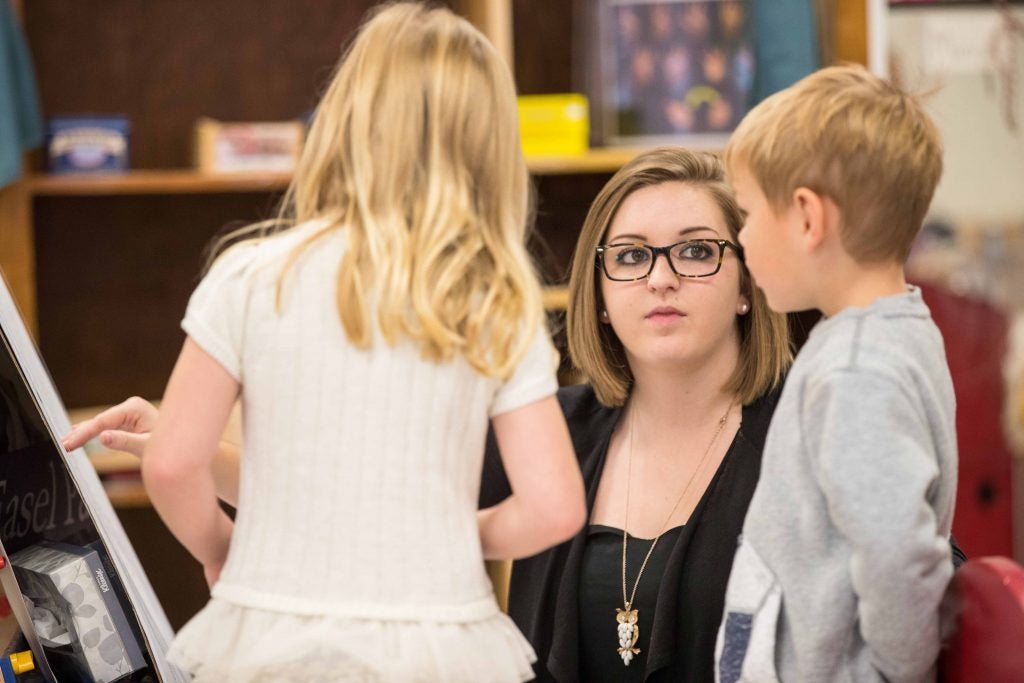Talking to children about recent tragedies
For weeks, social media feeds and televisions have been filled with harrowing stories of survival from hurricanes, floods and gun violence in the United States. Exposure to these stories may impact your children more than you think.
Children can experience secondary trauma – emotional duress that results when a person hears about a firsthand trauma experienced by another person. This can cause children to experience nightmares, difficulty concentrating in school, behavior and mood changes, fears about separation, and symptoms of anxiety and depression.
East Carolina University experts provide tips for discussing these events with your children to make sure they are processing the information and associated emotions in a healthy way.

Be reassuring
Melissa Nolan, director of the Nancy Darden Child Development Center at ECU, encourages parents to reassure their children that they are safe and will be taken care of no matter the outcome.
“Children do not have the cognitive ability to rationalize exaggerated comments. If they overhear an adult say, ‘the world will end,’ children believe the world will end,” said Dr. Sheresa Blanchard, assistant professor of human development and family science in ECU’s College of Health and Human Performance.
These kinds of statements can lead to fear and uncertainty.
What do they know
Though parents may limit what children view or hear at home about recent tragedies, it’s harder to completely shield them from conversations at school or social media posts. Dr. Erin Roberts, clinic director of the ECU Family Therapy Clinic, suggests parents ask their children what they know about recent events to get an idea of their understanding.
“Give children the space and the opportunity to share their emotions too and ask questions. Ask them how they feel about what they’ve seen and heard,” she said.
Be honest
Nolan says that it’s okay to be honest with your children and share what you are feeling in a way that is appropriate for their age.
“Don’t give children more information than what they want,” said Nolan. She suggests encouraging children to ask questions and for adults to stick with short, honest answers.
“Adults tend to give too much information,” she added.
“Kids are really good at noticing when we are upset,” said Roberts. “If they ask what’s bothering you, it’s okay to to be honest with them that recent events have made you sad. Ask them how they feel too.”
Choose your words and actions carefully
Children and teens pick up on change in a parent’s demeanor and may overhear conversations at home.
“Be aware of your moods and behavior and if it’s changed due to recent events,” said Roberts.
It can be confusing for children if the actions and words of their parents show they are upset but they tell their children everything is fine said Roberts.
“We don’t want to put too much on our children but it is okay to model how to identify your emotions and state them out loud,” she said.
Take care of yourself
It’s important for adults to know what they’re watching and how it is affecting them.
Roberts said we know ourselves best and if adults aren’t taking care of themselves and are taking in a lot of information from the media, they could become anxious and project their anxiety, fear or anger onto their children unintentionally.
“Take a few deep breaths, reflect on how this may be affecting you and do something that helps you take care of yourself,” said Roberts.
She suggests a relaxing bath, talking to a friend, going to therapy or getting involved in efforts to support victims of the tragedy.
“Taking care of yourself will give you more space to be able to be there for your children,” she said.
Meet our experts:
Dr. Sheresa Blanchard is an assistant professor of human development and family science at ECU in Greenville, North Carolina. Her research interests include early childhood education, parenting and family-centered practices.
Melissa Nolan is the director of ECU’s Nancy Darden Child Development Center, part of the Department of Human Development and Family Science. Her expertise includes best practices in early childhood education and child care administration.
Dr. Erin Roberts is the clinic director of ECU’s Family Therapy Clinic in the Department of Human Development and Family Science in the College of Health and Human Performance. Her research interests include the impact of trauma on individuals and families, family therapy and intimate partner violence.
-by Jamie Smith